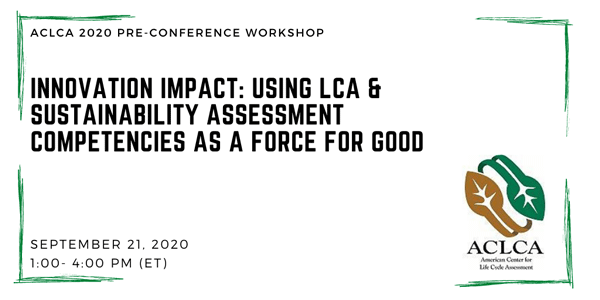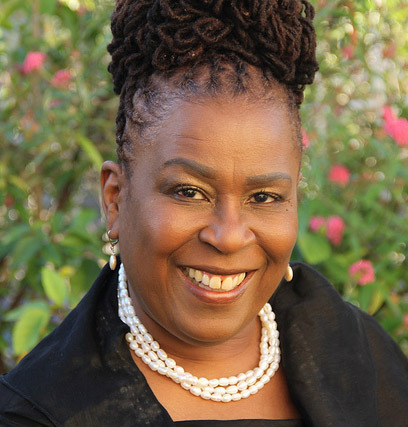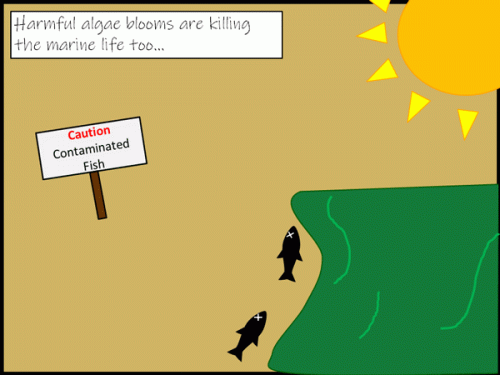August 2020 TheShift e-newsletter
Course Offerings at ACLCA from ESG | Dr. Claire A. Nelson Joins Our Team | ISSST Student Winner
Course Offerings at ACLCA 2020 with Our Analysts: Using LCA and Assessment Techniques for Decision Support
This ACLCA 2020 Virtual Conference course will show you how to support your organization’s strategic management with sustainability insights

If you’re an LCA professional who (like many of us) is seeing more demand for decision support in operations, design, innovation and/or impact investment, don’t miss a chance to learn from five of EarthShift Global’s most distinguished people: founder and CEO Lise Laurin, director of R & D Caroline Taylor, and senior sustainability analysts Nathan Ayer, Valentina Prado and David Evers.
They will draw on their own firsthand experience working with organizations of all sizes and types to team-teach a three-hour course on Sept. 21 at ACLCA 2020, Innovation Impact: Using and Expanding LCA and Sustainability Assessment Competencies as a Force for Good in a Speculative and Multi-criteria World. It will teach practitioners to leverage and expand their sustainability assessment skills in order to better inform holistic decision-making.
While this type of decision support has long been the purview of larger, well-established firms, there is growing demand for it at enterprises at every stage of development — impact investors have increasing clout, and environmental and social impacts are becoming key differentiators in highly competitive start-up landscapes. By exploring the practicalities of providing concrete, robust quantitative assessments that make sense to decision-makers, the course will help practitioners serve this growing need and engage colleagues from many disciplines.
We will look at how uniquely valuable perspectives can be developed by incorporating crucial broader sustainability factors, including the well-established techniques of LCA, anticipatory LCA approaches, multi-criteria decision analyses, and approaches like sustainability-return on investment (S-ROI). It will help you meet the needs of investors, manufacturers, entrepreneurs, and other key stakeholders.
The course will take place on Monday, September 21, 2020 -- 1:00-4:00 pm EDT
Registration information is available on the ACLCA website.
Getting LCA Data Right: Panel Discussion on LCA Data
Tuesday, September 22, 2020 -- 2:30-4:00 pm EDT
This is the expert panel that will close the special session. In addition to Bruce Vigon of Breveja Environmental Consulting as moderator, four or five experts will discuss recent progress, remaining challenges and directional change in data acquisition, review and use. Experts confirmed include Ezra Kahn, manager of the US LCA Commons Database; Terrie Boguski, Harmony Environmental; Connie Hensler, Interface, and Lise Laurin, Earthshift Global. Each of these experts brings varying experiences to the panel in the data arena. The session is intended to be very audience interactive.
Strategies and Best Practices for Connecting LCA Value to User Needs
Wednesday, September 23, 2020 -- 9:00-10:30 am EDT
Bruce Vigon, Jim Fava, Tim Skone, Jeff Zeman, Lise Laurin, Sanjeevan Bajaj
Breveja Environmental Consulting LLC, United States of America
We have seen an increase in our abilities to perform LCA studies (e.g., data bases, software, skills), and to use the information in decision making (e.g., innovation, marketing). Despite the insight and value that LCA brings and demonstration of its solid scientific underpinnings developed over the past 30 years, LCA has not yet achieved optimal adoption among decision-makers. Is this situation due to a significant gap between the provider and user communities in their understanding of actual user needs and consequentially how best to communicate and effectively apply life cycle assessment information? This session will explore this question and discuss ways to close the gap so that the role of LCA and LCA practitioners is elevated to the point that they are recognized as an essential component of balanced decision-making.
Recent collaboration among ACLCA, SETAC, and FSLCI has resulted in a continuing project exploring and advancing understanding where are we now, identifying where we want to be, and outlining milestones and actions to make it happen. This interactive panel will share: 1) what we have learned from over 30 years of applying LCA to inform decision making, 2) stories about successful applications that have bridged the gap to facilitate shared learning: 3) perspectives on the desired future state on use of LCA information, and 4) prospects to identify actions on how best to improve communicating LCA results to accelerate adoption and drive demand.
Quantifying Social Justice with LCA -panel discussion
Wednesday, September 23, 2020 -- 12:30-2:00 pm EDT
Today many organizations are struggling to understand their impacts on systemic racism, inequality, and social justice. While Life cycle assessments are generally used to analyze impacts on the physical environment and human health, Social LCA has advanced in recent years to bring life cycle thinking to social and socio-economic impacts. Social Return on Investment (SROI) brings accounting for the social, economic, and environmental value created by a company. Do these approaches currently address these social justice concerns?
Cottonseed Oil as an Alternative Vegetable Frying Oil
Thursday, September 24 - 9:00-10:30 am EDT
Valentina Prado1, Lise Laurin1, Nathan Ayer1, Jesse Daystar2, Steven Pires2
1Earthshift Global LLC, 2Cotton Inc
As brands in the food sector make a commitment to lower greenhouse gas (GHG) emissions, there is a market for edible vegetable oils with lower GHG emissions and a need to justify a competitive advantage in this aspect with science-based claims. Edible vegetable oils are used widely in industrial food processing and are derived primarily from rapeseed, soybean and palm oil.
Cottonseed oil (CSO), as a byproduct of cotton lint production, has a potential environmental advantage over other vegetable oil feedstocks as the impact of cotton cultivation is split between the cotton lint (used in the making of cotton textiles) and seed (taking 16% of cultivation impacts under an economic allocation approach). In the US, cotton production has consistently reduced its environmental impact over the past 35 years in terms of land use, soil loss, water use, energy use, and GHG emissions. Further, the US cotton industry has set aggressive 10-year sustainability goals, to be met by 2025, including reducing GHG emissions by 39% and water use by 18%. This study applies life cycle assessment (LCA) to explore the relative environmental impact of common vegetable frying oils (palm, soybean, and canola) relative to refined US cottonseed oil. In terms of climate change on a per kilogram basis, refined US CSO had the lowest impact and results were found to be statistically discernible. While there is a motivation to reduce climate change impacts, this study takes a broader look at impacts and applies an approach from multi criteria decision analysis to weigh tradeoffs considering uncertainty.
Dr. Claire A. Nelson Joins Our Team!

Dr. Claire A. Nelson, the experienced international sustainability engineer, futurist, and social entrepreneur brings systems-futures thinking perspective to our organization. Her success in developing a broad range of innovative development policies and initiatives, and her accomplishments on projects across many sectors in nations around the world, was due in large part to her training as an industrial engineer — a qualification that initially caused some surprise.
EarthShift Global is Proud to Announce the ISSST 2020 Student Winner: Dr. Katherine DeRose

As sustainable business practices become more mainstream, colleges and universities must provide their students with accompanying opportunities for knowledge-building and skill set development. EarthShift Global is on the forefront of this movement, currently providing LCA software packages, training, and guidance to over 180 Universities in North America. In this same note, we take pride in annually sponsoring student poster competitions at noteworthy professional conferences around the world.
Today, we congratulate Dr. Katherine DeRose, the winner of the ISSST 2020 Student Submission Competition!